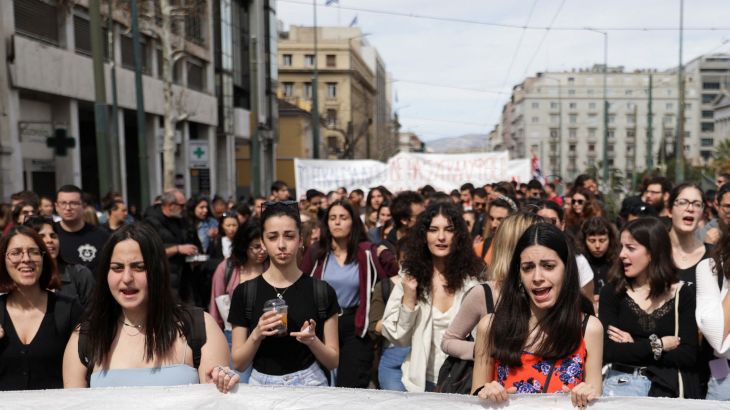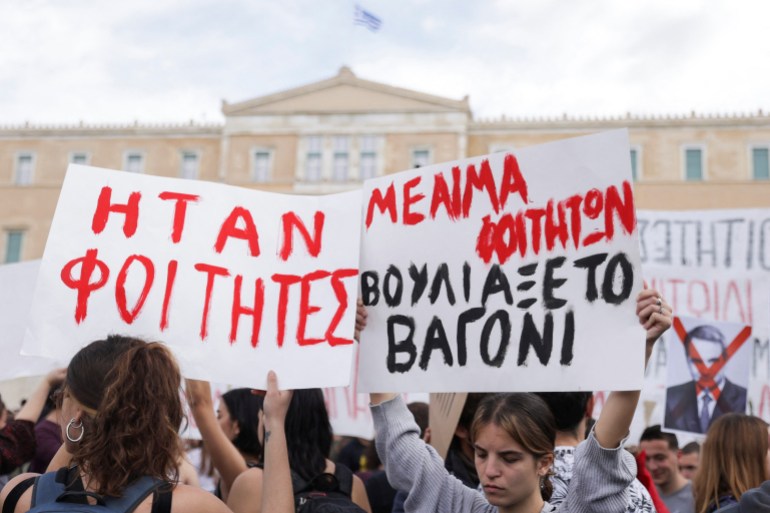Thousands rally in new Greece protests over train crash
Demonstrators demand punishment for those responsible for a train collision that killed 57 people.

Thousands of people have rallied in central Athens to protest over Greece’s deadliest rail disaster, which killed dozens of people last month.
The demonstrators expressed anger over safety deficiencies in Greece’s railway network and demanded punishment for those responsible for the head-on collision between a passenger train and a freight train that killed 57 people on February 28. Police said that more than 8,000 people in Athens gathered outside Parliament to protest on Sunday.
Keep reading
list of 4 itemsSorrow gives way to anger in Greece’s worst ever train crash
Greek stationmaster jailed pending trial after deadly train crash
Demonstrators, police clash at Greece train crash protest
Protesters flooded Athens’s Syntagma Square, waving banners that read “We won’t forget, we won’t forgive” and “We will become the voice of all the dead”.
“It was anger and rage that brought me here,” Markella, a 65-year-old Athens protester who gave only one name, told the AFP news agency.
Another demonstrator, 26-year-old Alexandros, added: “We’re getting desperate. You don’t know what to say, what to do – all you can do is join the protest.”
The protesters later marched to the offices of privatised train operator Hellenic Train. The company, which has been owned by Italy’s Ferrovie dello Stato Italiane since 2017, isn’t responsible for the maintenance of the railway network. State-owned Hellenic Railways is in charge of upkeep.
Reporting from Athens, Al Jazeera’s John Psaropoulos said “the message on the street today … was one of scepticism and confrontation towards the government”.
Authorities shut down four metro stations on two lines running through central Athens because of the protest.

The rally was organised by civil servants, a pro-communist union and university students.
In Thessaloniki, Greece’s second-largest city, about 5,000 people demonstrated.
Sunday’s rallies, which passed off without serious incident, weren’t as well-attended as similar events earlier in the week, when more than 30,000 had turned out in Athens and more than 20,000 in Thessaloniki.
A memorial service was conducted for 12 students of the Aristotle University of Thessaloniki, Greece’s largest university, who were killed in the train crash.
A stationmaster accused of placing the trains on the same track has been charged with negligent homicide and other offences, and the country’s transportation minister and senior railway officials resigned the day after the crash.
Public and private sector employees are expected to walk out again on Thursday.
‘Facetious’ reactions
Revelations of serious safety gaps on Greece’s busiest rail line have put the centre-right government of Prime Minister Kyriakos Mitsotakis on the defensive. He has pledged the government’s full cooperation with a judicial inquiry into the crash.
Mitsotakis, who is fighting to be re-elected later this year, has faced calls from some protesters to quit.
He has come under fire for initially pointing to “human error” for the accident, and blaming the stationmaster on duty at the time, who allegedly routed the trains onto the same stretch of track by accident.
But railway unions had long been warning about problems on the creaking, understaffed train network.
Al Jazeera’s Psaropoulos said the government “has been bending over backwards to appease public opinion.
“Just two days ago, the government announced that it would pay for national pensions equivalent to roughly $1,800 per family for each of those 57 people killed,” he said.
“The government is trying to reassure people that by the end of the month when railways start operating again – at least that is the government plan – all precautions will have been taken to have full staffing and properly trained staff on platforms and on trains.
“By the end of the summer, the prime minister has promised he’s going to have all those automated safety systems that didn’t work on the night of February 28, installed throughout the system – automatic signalling, automatic breaking and telemetry showing controllers where trains are and headed at all times.”
Elections in Greece are due later this spring, and opinion polls released over the past week have shown the ruling conservatives’ lead over the left-wing opposition shrink almost by half compared with polls published before the crash.